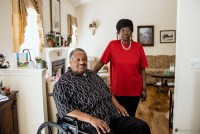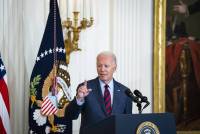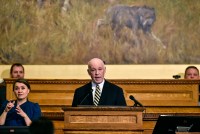Latest KFF Health News Stories
What One Lending Company’s Hospital Contracts Reveal About Financing Patient Debt
Within two years of North Carolina’s public university system going into business with AccessOne to finance patients’ payment plans, nearly half of its patients were in loans that charged interest. As federal scrutiny increases on lenders, KFF Health News is sharing that contract and others obtained through public records requests.
The Real Costs of the New Alzheimer’s Drug, Most of Which Will Fall to Taxpayers
The annual cost of lecanemab treatment quadruples if the expense of brain scans to monitor for bleeds and other associated care is factored in. The full financial toll likely puts it beyond reach for low-income seniors at risk of Alzheimer’s, experts say.
Be Aware: Someone Could Steal Your Medical Records and Bill You for Their Care
Consumers should know that this type of fraud can happen, whether from a large-scale breach or theft of an individual’s data. The result could be thousands of dollars in medical bills.
Journalists Explore Shortage of Foster Care Sites and Prevalence of Covid Misinformation
KFF Health News and California Healthline staff made the rounds on national and local media this week to discuss their stories. Here’s a collection of their appearances.
His Anesthesia Provider Billed Medicare Late. He Got Sent to Collections for the $3,000 Tab.
Medicare was supposed to cover the entire cost of his procedure. But after the anesthesia provider failed to file its claims in a timely manner, it billed the patient instead.
What the Health? From KFF Health News: Another Try for Mental Health ‘Parity’
President Joe Biden is kicking off his reelection campaign in part by trying to finish a decades-long effort to establish parity in insurance benefits between mental and physical health. Meanwhile, House Republicans are working to add abortion and other contentious amendments to must-pass spending bills. Joanne Kenen of the Johns Hopkins Bloomberg School of Public Health and Politico, Anna Edney of Bloomberg, and Sarah Karlin-Smith of the Pink Sheet join KFF Health News’ chief Washington correspondent, Julie Rovner, to discuss these issues and more. Also this week, Rovner interviews KFF Health News’ Céline Gounder about her podcast “Epidemic.” The new season focuses on the successful public health effort to eradicate smallpox.
Los líderes legislativos habían presionado a Newsom, también demócrata, para que canalizara los ingresos fiscales hacia la reducción de los costos de la atención sanitaria.
Covered California to Cut Patient Costs After Democratic Lawmakers Win Funding From Gov. Newsom
California’s health insurance exchange will reduce how much some patients pay for care next year, including hospital deductibles, appointment copays, and prescription drugs. Lawmakers pressed Gov. Gavin Newsom to make good on a four-year-old pledge to use proceeds from a tax penalty on uninsured people to help people pay for treatment.
New Weight Loss Drugs Carry High Price Tags and Lots of Questions for Seniors
Although nearly 40% of Americans 60 and older are obese, Medicare doesn’t cover weight loss medications. Meanwhile, studies haven’t thoroughly examined new drugs’ impact on older adults.
Everything Old Is New Again? The Latest Round of Health Policy Proposals Reprises Existing Ideas
House Republican legislation promises more health insurance options but fewer protections, even as the Biden administration seeks to rein in short-term plans, which were expanded in the Trump era.
Journalists Discuss Abortion Lawsuits and the Pros and Cons of Health Care Sharing Plans
KFF Health News and California Healthline staff made the rounds on national and local media this week to discuss their stories. Here’s a collection of their appearances.
Medical Debt Is Making Americans Angry. Doctors and Hospitals Ignore This at Their Peril.
Doctors and hospitals hold an exalted position in American life, retaining public confidence even as other institutions such as government, law enforcement, and the media are losing people’s trust. But with health care debt out of hand, medical providers risk their good standing.
A Mom Owed Nearly $102,000 for Hospital Care. Her State Attorney General Said to Pay Up.
As politicians bash privately run hospitals for their aggressive debt collection tactics, consumer advocates say one North Carolina family’s six-figure medical bill is an example of how state attorneys general and state-operated hospitals also can harm patients financially.
¿Cuánto costará la píldora anticonceptiva de venta libre? ¿La cubrirán los seguros?
Los defensores de la salud reproductiva celebraron esta histórica aprobación como un paso que puede ayudar a millones de personas a evitar embarazos no deseados, que ocurren casi la mitad de las veces en los Estados Unidos.
Once the New Over-the-Counter Birth Control Pill Is Available, What About Cost and Coverage?
The Food and Drug Administration’s approval is viewed as groundbreaking, but many details still must be figured out.
A Plan to Cut Montana’s Medicaid Waiting List Was Met With Bipartisan Cheers. Then a Veto.
Republican Gov. Greg Gianforte’s veto disappointed and bewildered those seeking to address low-income residents’ long wait for assisted living or in-home care.
What the Health? From KFF Health News: The Long Road to Reining In Short-Term Plans
President Biden made good on a campaign promise this week with a proposal that would limit short-term health insurance plans that boast low premiums but also few benefits. Meanwhile, the Supreme Court’s decision to outlaw affirmative action programs could set back efforts to diversify the nation’s medical workforce. Alice Miranda Ollstein of Politico, Amy Goldstein of the Washington Post, and Rachel Cohrs of Stat News join KFF Health News’ chief Washington correspondent Julie Rovner to discuss these issues and more. Also this week, Rovner interviews KFF Health News’ Bram Sable-Smith, who reported the latest KFF Health News-NPR “Bill of the Month” about how a hospital couldn’t track down a patient, but a debt collector could.
An Arm and a Leg: Wait, What’s a PBM?
Pharmacy benefit managers, or PBMs, are companies that negotiate the prices of prescription drugs. Hear about their role in raising drug prices and the ongoing efforts to regulate this complex industry.
With More People Giving Birth at Home, Montana Passed a Pair of Laws to Make It Easier
The state now requires Medicaid to cover midwife services and has expanded the list of prescription drugs midwives can administer.
As Nonprofit Hospitals Reap Big Tax Breaks, States Scrutinize Their Required Charity Spending
Nonprofit hospitals avoid paying taxes if they provide community benefits such as charity care. More states are examining that trade-off, scrutinizing the extent of hospitals’ spending on their communities.






















